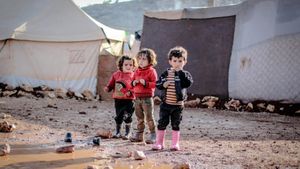The festive lights of Diwali, celebrated with joy across India and Pakistan, have this year shone against the backdrop of worsening air quality. While countless families engaged in traditional celebrations involving fireworks, the resulting spike in pollution levels has raised serious health alarms for millions.
Delhi, the capital city of India, again became the centre of attention as air quality plummeted dramatically following the Diwali festivities. Reports indicated alarmingly high levels of particulate matter, sharply elev0ated by the post-festival atmosphere of smoke-filled skies. According to the System of Air Quality and Weather Forecasting and Research (SAFAR), the Air Quality Index (AQI) for the city recorded figures soaring over 350 soon after the festival, risking serious health complications for its residents.
Across the border, Lahore, Pakistan, witnessed similar circumstances. Following Diwali, winds carried smoke and fine particulate matter (PM2.5) from India, causing the air quality index to hit more than 250, classifying it as 'very unhealthy'. Local authorities have issued warnings advising residents, especially those with respiratory ailments, to stay indoors and limit outdoor activities.
On the night of Diwali itself, New Delhi, home to more than 30 million people, was draped under layers of toxic smog. Many residents openly flouted city regulations prohibiting firecracker use, celebrating with loud explosions of color overhead. Despite attempts from authorities to enforce bans, such as seizing nearly two tonnes of fireworks prior to the festivities, the illegal sale of these products continued unabated. This contradiction has sparked outrage among environmentalists and health officials.
Critics argue the lack of stringent enforcement against firecracker use during Diwali highlights the complex interplay of tradition, law, and public health. "Delhi’s toxic air is killing us softly with its smog," commented Times of India last week, emphasizing the dire need for effective state intervention.
On the practical front, the World Air Quality Index Project recently reported conditions deemed ‘emergency status’ for Lahore, affecting the entire population's health. This was linked to strong winds from India, carrying with them significant pollution caused by fireworks and the burning of crop residues. These winds shifted rapidly, bringing more than just celebration; they imported potential public health crises.
For perspective, PM2.5 pollution poses severe risks, being tiny particles capable of entering the bloodstream through the lungs and adversely affecting health. NASA imagery highlights the severity of smoke from burning crop residues, showing how extensive these activities have become, contributing significantly to the air quality woes.
Health specialists have recommended vulnerable populations, including children and those with conditions such as asthma, avoid outdoor activities. Gauging the dangers, some local meteorologists hinted at the continued persistence of such smog conditions for the next 48 hours. The forecasts did not provide the necessary reassurance, leaving families fretting over the effects of poor air quality on their loved ones.
Compounding the air quality deterioration, local enforcement agencies have engaged digital technology to combat violations of government orders. An e-challan system utilizing artificial intelligence recorded over 600,000 fines imposed within just one day of the festivities, demonstrating the seriousness of the regulatory efforts.
The fireworks experienced worldwide are part of the cultural fabric of Diwali, representing the victory of light over darkness. Yet, they have generated public outcry among environmentalists for the harmful effects they pose on air quality. Pertinently, many families have shifted to quieter celebrations, lighting small candles and participating more minimally, opting for the safety of health and cleaner air over larger communal gatherings.
Meanwhile, as urgent calls for cleaner air abound, Delhi police find themselves toeing the line between tradition and regulation. The recent Supreme Court ruling, declaring clean air as a fundamental human right, has placed added pressure on local governments to take decisive action against pollution.
Instead of providing ferment for the festive season, the smog has reignited discussions on the ever-present battle against pollution in South Asia, especially during seasonal celebrations. People are witnessing the paradox of celebration leading to environmental harm. The emphasis on health concerns has become more pronounced as families struggle to breathe under the blanket of toxic air. Surveys reveal alarming statistics, showing significant percentages experiencing symptoms such as sore throats, coughs, eye irritation, and fatigue following Diwali.
Experts stress the importance of accountability, with environmental crises warranting collective action from the government, civil society, and local communities. The year-on-year worsening indicates systemic issues related to both pollution and environmental policy, underlining the urgent need for solution-driven strategies to address the health risks posed by events like Diwali.
While festivities should ideally bring people together, they invariably cast shadows on the pressing realities of air quality and health — issues critically needing both awareness and action, especially during one of the most culturally significant periods for millions.
Addressing pollution is not just about enforcement; it's about changing perceptions and behaviors surrounding traditional practices like firecrackers. Everyone must realize the importance of maintaining health and well-being during celebrations. The very premise of festivals lies within joy, and it can't thrive if overshadowed by health risks and environmental concerns.
Going forward, this festival season urges urgent conversations about how to find safer alternatives to celebrate cultural traditions without compromising the air quality or public health. With support from both the government and the populace, there is hope for sustainable celebrations, allowing the light of Diwali to truly shine bright and clean.



